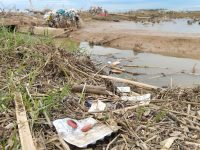
As Peretó (2020) reminded us in a recent text for Metode, «Humanity is facing fabulous challenges in the Anthropocene, such as the climate crisis or the emergence of new diseases which, thanks to air travel, rapidly become global». This new Metode monograph deals with one of these challenges, the climate crisis, through an «integrative treatment of the physical, ecological, socio-economic, and moral implications of climate change», according to the journal’s open call for papers. The aim is to «shed light on the opportunities for a paradigm shift towards a more sustainable society».
«It is not enough to address the climate crisis: it is necessary to tackle the entire set of problems that contribute to exceeding planetary boundaries»
Our contribution is based on recognising the multiple problems that humanity has to face today, and evidencing the need to take them all into account when trying to advance towards solving each one of them, for example, the climate crisis.
The many problems of the worldwide emergency
The climate crisis is now considered an extremely serious matter. It is linked to the increase in greenhouse gases and is clearly anthropogenic in origin, requiring the urgent adoption of mitigating and adaptive measures to halt the degradation of ecosystems and make human societies sustainable. This is shown by numerous concurring studies, involving large groups of experts, such as the Intergovernmental Panel on Climate Change (IPCC).
As Folke (2013) pointed out, the concentration of CO2 in the atmosphere in 2013 was well over 350 parts per million (ppm), a planetary limit that must be respected if the Earth is to remain in a Holocene-like state. Unfortunately, reality has followed a different direction: in 2019, we reached 400 ppm, and as of today we have already exceeded 410 ppm. Folke also reminded us about the nine identified «planetary boundaries», corresponding to biophysical constraints that must not be exceeded if we want to ensure an environment that is compatible with the development of human societies. These limits (Rockström et al., 2009) refer specifically to the following processes: rate of biodiversity loss; nitrogen and phosphorus cycles (N2 and P extracted from the atmosphere for agricultural fertilisers and other uses); stratospheric ozone depletion; ocean acidification; global freshwater use; change in land use; atmospheric aerosol loading; chemical pollution; and, of course, the aforementioned climate disruption. To these nine limits, we should add another, linked to human population growth, since all the dangers of overreach are closely connected to population size (and the over-consumption of a significant part of its members).
It is therefore clear that in order to address the planetary emergency, avoiding an increase in greenhouse gas concentrations is not enough: all planetary limits must be kept in check. In fact, these limits are interdependent and breaching one can lead to the modification and breaching of others. In other words, it is not enough to address the climate crisis: it is necessary to tackle the entire set of closely interlinked problems that contribute to exceeding planetary boundaries and, ultimately, to a situation of unsustainable planetary emergency, which calls for an urgent transition to sustainability, i.e., profoundly rethinking the relationships of human groups with each other and with the environment.
Transitioning to sustainable societies
Tackling the climate crisis – as expressed in both the 2015 Paris Agreement (under the UN Framework Convention on Climate Change) and the Sustainable Development Goals (7 and 13) – calls for an urgent energy transition leading to decarbonisation. However, given that the climate crisis is closely linked to a whole set of mutually reinforcing problems, this absolutely necessary energy transition will be insufficient to enable an effective transition to sustainable societies: other simultaneous transitions will also be needed:
A transition towards responsible consumption, together with circular, restorative, and regenerative economy strategies that drastically reduce the current rate of depletion of all kinds of essential resources, as well as the continuous output of polluting waste, in order to move from the predatory hyper-consumption of large minorities to sustainable consumption, accessible to everyone (addressing hunger and extreme poverty) and in solidarity with future generations as well.
An urban transition that reshapes urbanisation processes and transforms cities into healthy and sustainable spaces that favour the connection with surrounding rural and natural areas, which must be duly protected.
A demographic transition that provides the means – already in place – to enable a responsible parenthood that is able to plan the desired number of children and when to have them (by choice, not by chance).
A transition from predatory anthropocentrism towards a biocentrism that puts an end to the accelerated loss of biodiversity that threatens to break the balance of the biosphere and drag the human species itself into this destructive process.
A transition from the imposition of uniformity to the protection and promotion of cultural diversity. Let us not forget that cultural diversity guarantees a plurality of responses to our problems and that each culture represents richness, not only for the people who created it, but also as a heritage for the whole of humanity.
A labour transition to meet the needs of adequate employment for all and avoid unacceptable imbalances (Poschen, 2015). While techno-scientific innovation leads to the suppression of many simple tasks, new sources of employment are necessary and possible to satisfy the fundamental rights of citizens and contribute to the transition to sustainable societies: the development of renewable energies, ecological urban planning, digitalisation, ecological agriculture, protection and restoration of ecosystems… as well as jobs aimed at guaranteeing universal access to public services such as health or education and boosting the production, dissemination, and consumption of cultural goods as an alternative to the unsustainable consumption of material goods (Maaluf, 2009).
A transition from competitiveness towards cooperation and the universalisation of human rights. Planetary regulations based on cooperation and solidarity are needed. They can avoid the imposition of particular interests that are harmful to other people or to future generations.
Each of these transitions is a sine qua non condition for achieving sustainability, because, as we have noted, the problems they seek to address are interconnected and affect each other through complex associations. Focusing exclusively on one, such as the climate crisis, may obstruct other equally necessary transitions and condemn the human species and the biosphere as a whole to degradation. This is why some have started to develop a «sustainability science» (Kates et al., 2001), which integrates contributions to sustainability from different disciplines, enhances citizen participation, and makes use of «glocal» (both global and local) strategies, looking at both the short and the long term.
The transition to sustainability is therefore not a simple task and requires a profound transformation of the socio-economic model, of our habits, and, in short, of the way we relate to nature and to each other. It may not be easy, but it is possible and urgently necessary to guarantee the continuity of our species in decent living conditions for all human beings.
References
Folke, C. (2013). Respecting planetary boundaries and reconnecting to the biosfere. In E. Assadourian, T. Prugh, & Worldwatch Institute (Eds.), The state of the world 2013: Is sustainability still possible? W. W. Norton.
Kates, R. W., Clark, W. C., Corell, R., Hall, J. M., Jaeger, C. C., Lowe, I., McCarthy, J. J., Schellnhuber, H. J., Bolin, B., Dickson, N. M., Faucheux, S., Gallopin, G. C., Grübler, A., Huntley, B., Jäger, J., Jodha, N. S., Kasperson, R. E., Mabogunje, A., Matson, P., … Svedin, U. (2001). Sustainability science. Science, 292(5517), 641–642. https://doi.org/10.1126/science.1059386
Maaluf, A. (2009). Le dérèglement du monde. Quand nos civilisations s’épuisent. Éditions Grasset & Fasquelle.
Peretó, J. (2020). La COVID-19 i el costat fosc de la promiscuïtat de la vida. Mètode, 105, 6–7.
Poschen, P. (2015). Decent work, green jobs and the sustainable economy. Greenleaf Publishing and International Labour Office.
Rockström, J., Steffen, W., Noone, K., Persson, A., Chapin III, F. S., Lambin, E. F., Lenton, T. M., Scheffer, M., Folke, C., Schellnhuber, H. J., Nykvist, B., De Wit, C. A., Hughes, T., Van der Leeuw, S., Rodhe, H., Sörlin, S., Snyder, P. K., Constanza, R., Svedin, U., … Foley, J. A. (2009). A safe operating space for humanity. Nature, 461, 472–475. https://doi.org/10.1038/461472a





